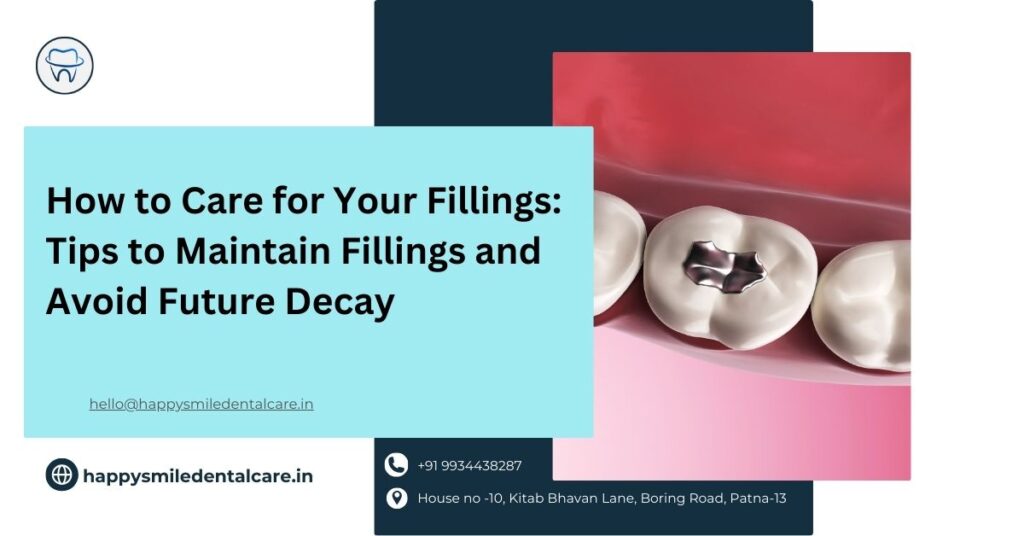Did you know that proper care for your dental fillings can extend their lifespan and keep your smile healthier for longer? Fillings are an essential part of restoring your teeth when cavities strike, but their durability depends heavily on how well they’re cared for. By incorporating a few simple habits and knowing what to look out for, you can make sure your fillings do their job effectively—and keep future decay at bay.
Whether you’ve recently received your first filling or want to preserve existing ones, this guide will walk you through everything you need to know to maintain your fillings and ensure excellent oral health.
Understanding Dental Fillings
What Are Dental Fillings?
Dental fillings play a crucial role in repairing teeth affected by cavities or decay. When part of a tooth is damaged due to decay, your dentist removes the affected area and fills it with a material designed to restore the tooth’s shape, strength, and function. Fillings help prevent further decay by sealing the vulnerable area, ensuring a healthier smile.
Types of Fillings
Understanding the types of fillings can help you make informed decisions about your dental care. The most common materials used for fillings include:
- Composite Fillings
Made of resin and designed to match your natural tooth color, composite fillings are a popular choice for a seamless look.
- Amalgam Fillings
Known for their strength and affordability, these silver-colored fillings are often used on back teeth that endure heavy chewing.
- Gold Fillings
Durable and long-lasting, gold fillings are an excellent option but come at a higher cost.
- Porcelain Fillings
These fillings are custom-made to mimic the natural appearance of teeth and are resistant to staining, offering another aesthetic choice.
Each type has unique characteristics, and your dentist will recommend the best option based on the location and severity of the filling required.
Why Filling Care Matters
Preventing Further Decay
Neglecting proper care for your fillings can expose your teeth to further decay. Without maintenance, bacteria can make their way into the spaces around the filling, leading to issues that might require additional, and often more invasive, treatment.
Supporting Overall Oral Health
Fillings are an integral part of ensuring your teeth remain functional for everyday tasks like chewing and speaking. Poor care of fillings could lead to discomfort or even tooth loss in severe cases. By maintaining them diligently, you’re contributing to your overall oral health—and protecting your beautiful smile.
Tips for Caring for Your Fillings
1. Maintain Good Oral Hygiene
The foundation of filling care is consistent oral hygiene. Use these best practices:
- Brush Twice Daily
Use a fluoride toothpaste to effectively clean your teeth while strengthening enamel around your fillings.
- Floss Daily
Pay extra attention when flossing near your fillings to remove food particles and plaque without damaging the material.
- Rinse with Mouthwash
An antimicrobial mouthwash helps reduce bacteria and protect all areas of your mouth.
2. Avoid Hard or Sticky Foods
Certain foods can harm your fillings. It’s best to avoid:
- Hard Candies and nuts that may crack or chip your filling.
- Sticky Sweets like caramel or toffee that can dislodge them.
Instead, stick to foods that are easier to chew and won’t exert unnecessary pressure on your fillings.
3. Schedule Regular Check-Ups
Regular dental visits are critical for filling care. Here’s why:
- Dentists can identify wear and tear on fillings before they become a bigger issue.
- Professional cleanings remove plaque and tartar that regular home care might miss.
Aim for dental check-ups at least twice a year to stay ahead of any potential issues.
4. Watch for Signs of Damage
Be mindful of these warning signs that a filling may need attention:
- Sensitivity to temperatures or sweets.
- Cracks or rough spots on the filling.
- Discoloration that might indicate wear or decay around the edges.
Don’t wait if you notice any of these symptoms, schedule a dental appointment promptly.
Managing Sensitivity After Filling Procedures
Why Sensitivity Happens
It’s common to experience mild sensitivity after getting a filling, especially to hot or cold foods. This is usually temporary and results from your tooth adjusting to the new material.
Tips to Alleviate Sensitivity
- Use toothpaste formulated for sensitive teeth to protect and calm nerves.
- Avoid very hot or cold foods and beverages for the first few days.
- Swish with warm salt water to reduce inflammation and promote healing.
If sensitivity persists beyond a week, consult your dentist to rule out any complications.
When to Replace or Repair Fillings
Signs That a Filling May Need Replacement
Fillings aren’t meant to last forever. Here are signs it might be time for a replacement or repair:
- You feel a sharp edge or a crack in the filling.
- The tooth feels painful when biting or chewing.
- The filling is visibly worn or discolored.
What to Expect During Replacement
Replacing a filling is a straightforward process. Your dentist will remove the worn filling, clean the area, and install a new one. Depending on the filling type, you might even consider upgrading to a more durable or aesthetic material.
Keeping up with regular dental visits ensures that any worn fillings are addressed before they lead to more serious dental issues.
How Happy Smile Dental Care Supports Filling Maintenance
At Happy Smile Dental Care, we understand the importance of long-lasting and well-maintained dental fillings. That’s why we offer:
- Comprehensive check-ups to monitor the health of your fillings.
- Expert guidance on proper care and aftercare.
- Personalized treatment plans to address any issues promptly and effectively.
Our goal is to provide superior dental care that keeps your smile healthy and beautiful for years to come.
Keep Your Fillings and Smile Healthy
Proper filling care is essential for maintaining strong, healthy teeth. By practicing good oral hygiene, avoiding harmful foods, and visiting your dentist regularly, you can extend the lifespan of your fillings and enjoy a healthier smile.
Want to learn more about preserving your teeth and fillings? Contact Happy Smile Dental Care today to speak with our team or schedule an appointment. Together, we can help you achieve and maintain exceptional oral health!
Conclusion
Your oral health is an essential part of your overall well-being, and well-maintained fillings play a crucial role in protecting your teeth. At Happy Smile Dental Care, we are dedicated to providing you with the knowledge, care, and personalized treatments you need for a lifetime of healthy smiles. Don’t wait—take proactive steps to preserve your dental health today. Schedule your next visit with us, and let’s work together to keep your smile strong and vibrant!

